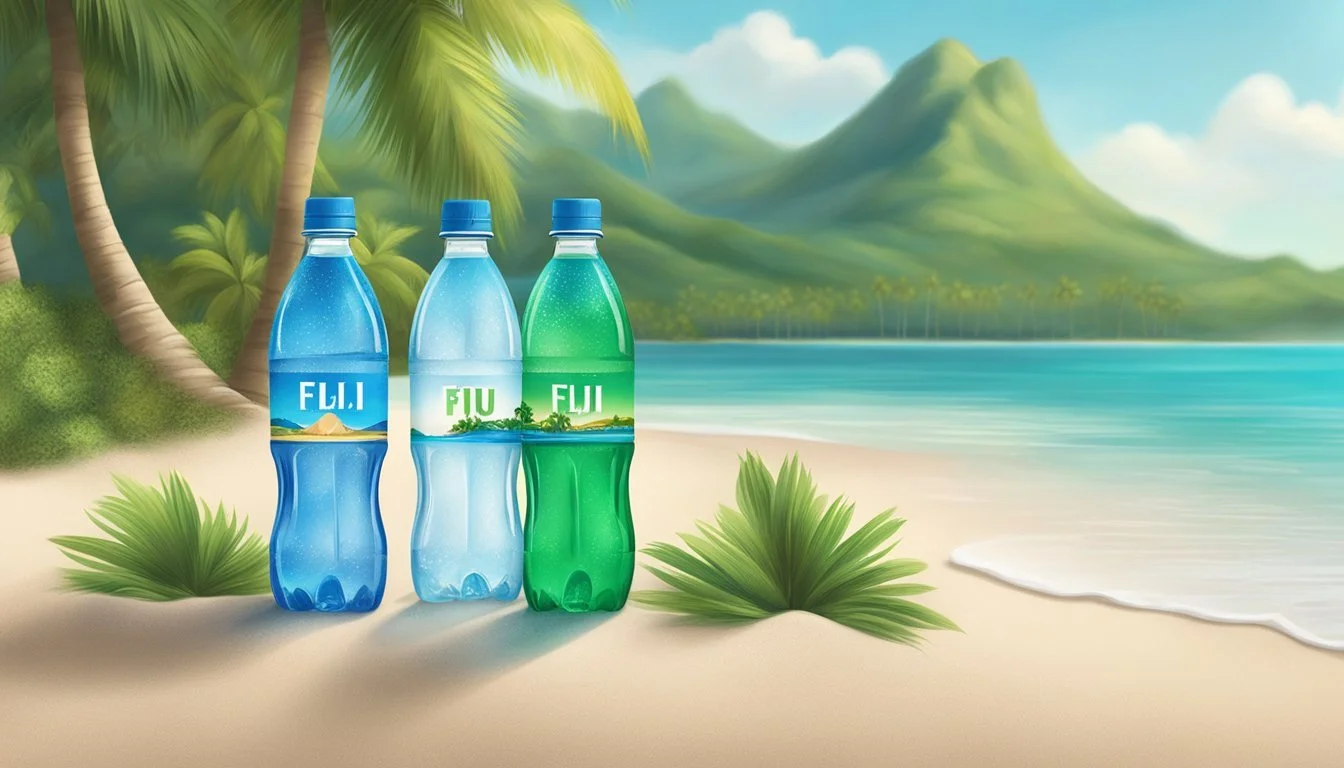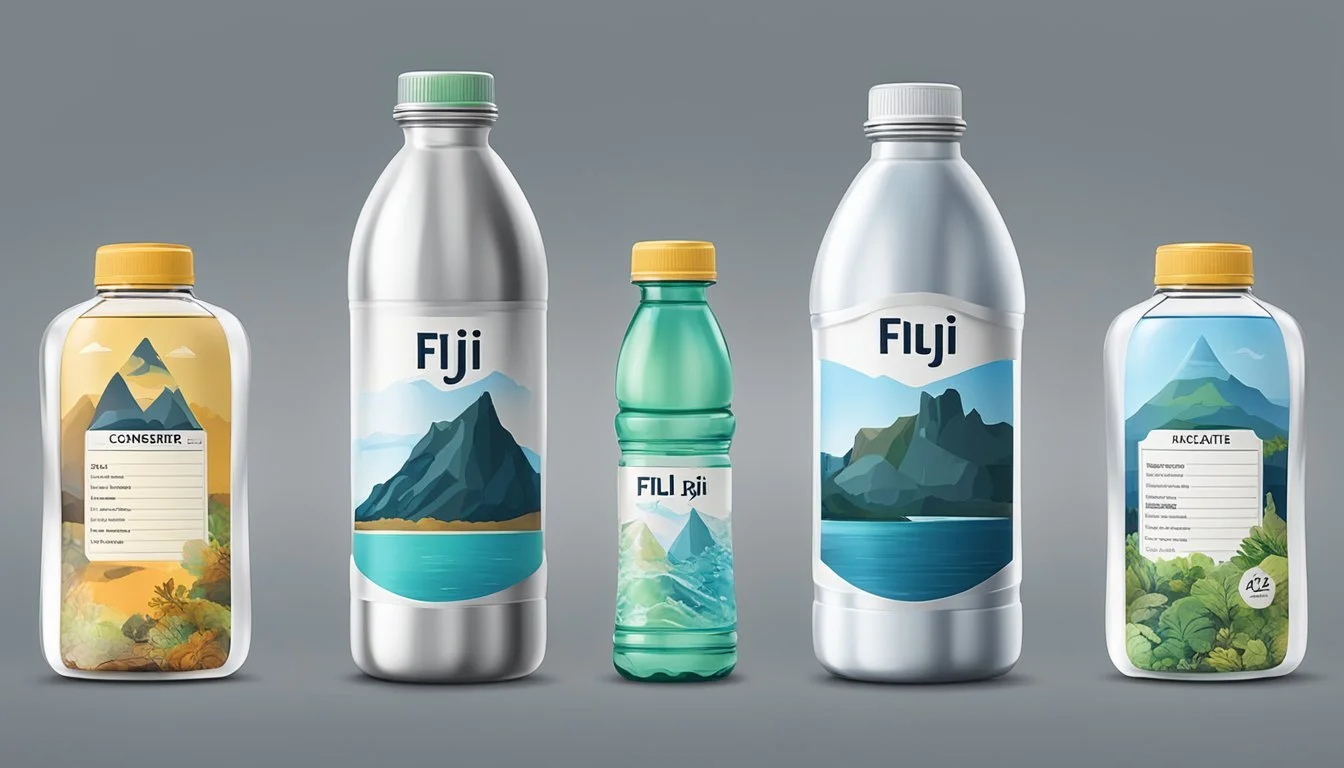Fiji vs. Castle Rock
Which Bottled Water is Better? An Expert Comparison
In the world of bottled water, consumers are often faced with a plethora of choices, making it difficult to determine which brand deserves their loyalty. Two prominent contenders in the premium bottled water market are Fiji and Castle Rock. Both brands boast unique attributes and loyal followings, but choosing between them can be challenging.
When comparing Fiji and Castle Rock, Fiji often stands out for its mineral-rich profile and smooth taste, sourced from the pristine aquifers of Fiji's Viti Levu island. Castle Rock, on the other hand, is prized for its pure, naturally alkaline water that originates from the majestic Mount Shasta in Northern California. Health-conscious consumers and environmentalists might lean towards Castle Rock, appreciating its sustainability practices and commitment to environmental stewardship.
Taste, source, and environmental impact are crucial factors that help distinguish these brands. Fiji's balanced mineral content offers a unique hydration experience, while Castle Rock's emphasis on purity and environmental care provides peace of mind to its drinkers. The choice between Fiji and Castle Rock ultimately boils down to personal preference and priorities regarding taste and environmental considerations.
The Significance of Bottled Water in the US Market
Bottled water holds a significant place in the US market. It has become a daily choice for many consumers seeking convenience and reliability. According to recent studies, nearly 60% of Americans regularly purchase bottled water.
One reason for this popularity is the perception of purity and safety. Many believe bottled water to be cleaner than tap water. This belief influences consumer choices significantly.
Comfort and accessibility are other key factors. Bottled water is available almost everywhere, from grocery stores to vending machines. This widespread availability makes it an easy option for hydration on-the-go.
Various bottled water brands vie for consumer attention. Each brand offers unique selling points. For example:
Fiji Water emphasizes its natural artesian source and mineral profile.
Castle Rock focuses on spring water purity and a crisp flavor.
These distinctions allow consumers to find a brand that aligns with their preferences.
Price also plays a critical role. Bottled water ranges from budget-friendly options to premium varieties. This spectrum ensures that there are choices for different budgets.
In recent years, environmental concerns have also emerged. Single-use plastics contribute significantly to pollution. Many customers are now looking for brands that offer eco-friendly packaging solutions.
Despite these concerns, the demand for bottled water continues to grow. For many, its convenience and perceived quality outweigh the negatives. As the market expands, it is likely that innovations in packaging and sustainability will become more prominent.
Understanding Fiji Water and Castle Rock Water
Fiji Water and Castle Rock Water are two premium bottled waters with distinct characteristics. They differ in their origins, production processes, taste profiles, and mineral content.
Origins and Production Processes
Fiji Water originates from an artesian aquifer located in Viti Levu, one of Fiji’s largest islands. This aquifer is surrounded by volcanic rock, which naturally filters the water. The water remains untouched by human hands until it is bottled at the source. This isolation helps preserve its purity.
Castle Rock Water is sourced from a natural spring in the Mount Shasta region of Northern California. The spring water is naturally filtered through layers of ancient volcanic rock. This natural filtration process enriches the water with minerals. Bottling occurs close to the source to maintain the water's quality.
Taste Profile and Mineral Content
Fiji Water is known for its smooth taste and soft mouthfeel. This is partly due to its high silica content, which gives it a silky texture. Fiji Water also contains essential electrolytes such as sodium, potassium, and magnesium that enhance its flavor without overpowering it.
Castle Rock Water offers a refreshing and crisp taste, attributed to its natural spring water origin. The mineral content includes calcium, magnesium, and bicarbonates, which contribute to its clean taste. The natural filtration through volcanic rock adds a balanced mineral profile, making it appealing to those who prefer a neutral and invigorating taste.
Health and Hydration: Evaluating Quality and Benefits
When comparing Fiji and Castle Rock bottled water brands, assessing factors like safety standards, purity, and nutritional benefits can greatly impact consumer choice, particularly for those concerned about health and hydration.
Safety Standards and Purity Considerations
Both Fiji and Castle Rock claim to adhere to strict safety standards. Fiji Water is sourced from an artesian aquifer in Fiji, naturally filtered through volcanic rock which gives it a clean and contaminant-free profile.
Castle Rock Water, sourced from protected springs in California, similarly boasts excellent purity levels.
Brand Source pH Level Contaminants Tested Fiji Artesian aquifer, Fiji 7.7 Free from heavy metals and harmful chemicals Castle Rock Springs, California Approx. 7.6 Meets federal safety standards, low in contaminants
Consumers should ensure that any bottled water they choose is certified by relevant health authorities to be free from harmful levels of contaminants such as heavy metals and fluoride.
Nutritional Advantages of Enhanced Water
Fiji Water is known for its mineral composition that includes silica, calcium, and magnesium, contributing to bone health and overall hydration.
Castle Rock offers a slightly different mineral profile, with a focus on a balance of essential electrolytes like potassium and sodium, which are vital for maintaining electrolyte balance.
Mineral Fiji Water (mg/L) Castle Rock Water (mg/L) Silica ~93 - Calcium ~20 ~27 Magnesium ~15 ~30 Potassium ~5 ~5.5
The pH levels of both brands are close to neutral but slightly alkaline, providing potential benefits for those who prefer water with a higher pH for perceived health advantages.
For those who prioritize enhanced water benefits, understanding the different mineral profiles and the associated health benefits of both brands is essential.
Comparative Analysis of Packaging and Environmental Impact
This section focuses on the materials used in bottling Fiji and Castle Rock waters, as well as the sustainability practices of the companies behind these brands. It addresses the environmental repercussions and the steps taken by each brand to mitigate their carbon footprint and promote environmentally friendly practices.
Bottle Materials and Contribution to Waste
Fiji Water uses single-use plastic bottles, specifically made from polyethylene terephthalate (PET). These plastic bottles, while lightweight and durable, contribute significantly to plastic waste if not properly recycled. The carbon footprint from producing and transporting these plastic bottles is considerable, raising concerns about its environmental impact.
In contrast, Castle Rock Water opts for glass bottles and aluminum cans. Glass bottles are more environmentally friendly due to their reusability and recyclability. Aluminum cans also offer a sustainable option, as aluminum is one of the most recyclable materials available. This choice reduces plastic waste and lowers the overall environmental impact.
Sustainability Practices of Bottled Water Companies
Fiji Water invests in various sustainability initiatives, such as reducing their carbon footprint through energy-efficient production processes. Yet, the reliance on single-use plastic remains a significant environmental challenge. Their attempts to offset carbon emissions are noteworthy but do not entirely negate the harm caused by plastic waste.
Castle Rock Water prides itself on employing more sustainable methods. The use of glass and aluminum for packaging is part of a broader commitment to reduce environmental impact. Additionally, Castle Rock Water uses renewable energy in their bottling plants and prioritizes environmentally friendly practices throughout their supply chain. This comprehensive approach underscores the company’s commitment to sustainability and reducing the carbon footprint.
Taste Sensation and Individual Preferences
Taste is a key factor in choosing bottled water. Fiji Water is often praised for its smooth and soft taste, attributed to its natural mineral profile, gathered as the water filters through volcanic rock. This process infuses the water with electrolytes, enhancing its flavor.
Castle Rock Water boasts a crisp and clean taste, sourced from springs in California. The water’s journey through ancient geological formations imparts a unique mineral blend, appealing to many consumers.
Individual preferences play a significant role in water choice. Some people prefer the subtle, mineral-rich flavor of Fiji, while others gravitate towards the fresh and pure taste of Castle Rock. These varying preferences highlight the subjective nature of taste.
Here’s a brief comparison:
Feature Fiji Water Castle Rock Water Mineral Profile Natural minerals and electrolytes Unique blend from springs pH Level Typically around 7.7 Varies but usually neutral Taste Description Smooth and soft Crisp and clean
Water sommeliers, experts in the taste profiles of water, often note these distinctions. They help consumers understand the nuanced differences between brands, ensuring a more informed choice based on personal taste preferences.
As people's taste profiles differ widely, some might find Fiji’s mineral-rich taste more appealing, while others might favor the refreshing purity of Castle Rock. Evaluating these aspects helps determine which bottled water aligns better with individual taste preferences.
Cost Factors and Consumer Considerations
When it comes to bottled water, cost is a significant factor for many consumers. Fiji Water typically has a higher price compared to other brands, often attributed to its unique sourcing from an underground aquifer in Fiji and the associated shipping costs.
Brand Average Price (per bottle) Fiji Water $2.50 Castle Rock Varies by region
Castle Rock Water, sourced from natural springs in Northern California, often presents a variable price depending on regional availability and distribution costs. This could make it more accessible or expensive depending on where you are shopping.
Individual preferences often influence consumer choices. For those prioritizing eco-friendly options, Castle Rock may appeal more due to its localized sourcing and the potential for a reduced carbon footprint.
From an economic standpoint, Castle Rock can sometimes offer more competitive pricing. For instance, a typical bottle of Castle Rock Water could range from $1.50 to $2.00, which may be more appealing to budget-conscious shoppers.
Consumer choices in bottled water can also be swayed by brand perception and marketing strategies. Fiji Water's strong brand image and perceived premium quality allow it to maintain a higher price point without deterring loyal customers.
In summary, understanding the cost factors and consumer considerations helps buyers make informed decisions based on price, environmental impact, and personal preferences.
Global Reach and Market Presence
Fiji Water and Castle Rock both have established themselves in the premium bottled water segment. Fiji Water, sourced from an artesian aquifer in the Yaqara Valley of Viti Levu, Fiji, is widely recognized for its international presence.
Castle Rock, sourced from a pristine aquifer in California, has a more localized distribution but is gradually expanding.
Fiji Water has penetrated markets globally. The brand is available in major markets such as the United States, Europe, Asia, and Australia. Its widespread availability is owed to strategic marketing and premium positioning.
Castle Rock Water, while less internationally recognized, has a loyal customer base in the United States. The brand focuses on its purity and environmental commitments, appealing particularly to eco-conscious consumers.
The bottled water industry is highly competitive, with prominent brands such as Nestle Pure Life, Aquafina, Dasani, Smartwater, Voss, Evian, San Pellegrino, Norwegian, Icelandic Glacial, Polish Spring, Mountain Valley, and Acqua Panna. These companies have significant market presence and compete for consumer loyalty through various unique selling points.
Fiji Water's marketing campaigns often emphasize the "untouched" nature of its source. This image of purity and exclusivity has contributed significantly to its brand strength. Castle Rock leverages its focus on sustainability, using eco-friendly packaging and emphasizing its local sourcing.
Both brands face challenges related to environmental concerns. Efforts to minimize the carbon footprint and sustainable packaging are crucial aspects of their market strategies.
More About Fiji
Fiji vs Mountain Valley Spring Water: Which Bottled Water is Better?
Fiji vs Whole Foods Italian Still Mineral water: Which Bottled Water is Better?
More About Castle Rock
Aqua Carpatica vs Castle Rock: Which Bottled Water is Better?
Castle Rock vs Cascade Mountain: Which Bottled Water is Better?
Castle Rock vs Crystal Geyser: Which Bottled Water is Better?
Castle Rock vs Hawaii Volcanic: Which Bottled Water is Better?
Castle Rock vs Hawaiian Springs: Which Bottled Water is Better?
Castle Rock vs Kirkland Signature: Which Bottled Water is Better?
Castle Rock vs Purely Sedona: Which Bottled Water is Better?
Castle Rock vs Richard's Rainwater: Which Bottled Water is Better?
Castle Rock vs Solan de Cabras: Which Bottled Water is Better?
Castle Rock vs Talking Rain AQA: Which Bottled Water is Better?
Castle Rock vs Whole Foods 365: Which Bottled Water is Better?
Castle Rock vs Whole Foods Italian Still Mineral water: Which Bottled Water is Better?
Core Hydration vs Castle Rock: Which Bottled Water is Better?
Icelandic Glacial vs Castle Rock: Which Bottled Water is Better?
Mountain Valley Spring Water vs Castle Rock: Which Bottled Water is Better?
Nestle Pure Life vs Castle Rock: Which Bottled Water is Better?
Poland Spring vs Castle Rock: Which Bottled Water is Better?
San Pellegrino vs Castle Rock: Which Bottled Water is Better?






